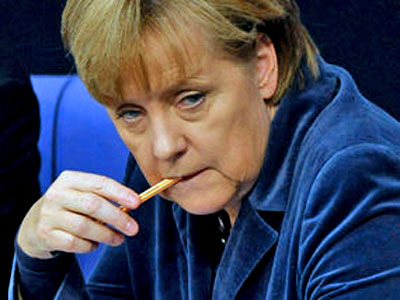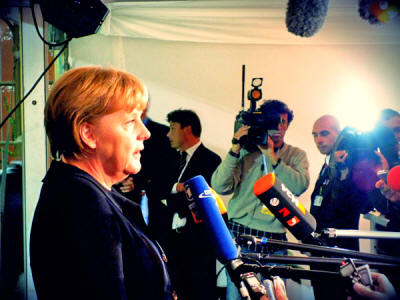
by Macer Hall
Political Editor
October 27, 2011
from
Express Website

Chancellor Angela Merkel
at the German parliament
yesterday
Just hours after Germany issued a chilling
warning that war could again engulf Europe, EU leaders made a desperate 1
trillion bid to save the euro.
EuroZone leaders sealed a three-part deal in the hope that the markets would
be convinced there had been effective response to the crisis.
Officials in Brussels said an accord had been reached with banks on a 50%
write-off of Greek debt and they also approved a complex mechanism to boost
the EuroZone's main bailout fund to 1tr euro (£880bn).
The FTSE 100 index was 2 per cent higher this morning as investors welcomed
the long-awaited action plan.
But only hours earlier, concerned about the consequences of a failure to
deal with the crisis in the EuroZone, German Chancellor Angela Merkel
raised the
spectre of military conflict.
Another half century of peace and prosperity in Europe is not to be taken
for granted.
If the euro fails, Europe fails.
“What is good for Europe is good for
Germany,” she said.
“Another half century of peace and prosperity in Europe is not to be
taken for granted. If the euro fails, Europe fails. We have a historical obligation: To protect by all means Europe’s unification
process begun by our forefathers after centuries of hatred and blood
spill. None of us can foresee what the consequences would be if we were
to fail.
“It cannot be that some time in the future they say the political
generation responsible for Europe in the second decade of the 21st
century has failed in the face of history.”
Mrs. Merkel delivered her warning to the German
parliament, where she won a crucial vote for backing emergency financial
measures for the EuroZone.
Her comments surprised many observers who suggested that now was a time for
cool heads if the euro crisis was to be resolved, and it would not help to
raise the spectre of war.
But British officials heading to Brussels for the chaotic crisis summit
feared EuroZone leaders had failed to scrabble together the “big bazooka”
remedy needed to rescue the single currency, despite proposals for stitching
together a trillion-plus euro rescue package.
One senior Tory in Brussels dismissed the plans as,
“a sticking plaster on a gaping wound”.
All 27 EU leaders backed a proposal to increase
cash holdings to nine per cent of their balance sheets.
As the summit broke up last night, David Cameron said:
“We made some good progress tonight. It’s
very much in Britain’s interests that we sort out these problems and
solve this crisis."
“We have made good progress on the bank recapitalization; that wasn’t
watered down, it has now been agreed. It will only go ahead when the
other parts of a full package go ahead and further progress on that
needs to happen tonight.”
Mr. Cameron was understood to be fiercely
resisting attempts to squeeze more cash out of British taxpayers for saving
the euro.
And he was putting pressure on EuroZone leaders to sort out the debt crisis
that threatens to plunge Europe - and the UK - into recession. But there was
growing skepticism among senior Tories that the EuroZone in its present form
can survive the crisis.
Martin Callanan, leader of the Tories in the European Parliament,
said:
“Once again we are being told this is the
make or break summit. We were told the same on Sunday and the same
before the summit before that."
“They march us to the top of the hill and march us down again.”
He added:
“They may come up with another short-term
fix, but it will all be based on borrowed money and shuffling of debt.
“Without addressing the fundamentals, it remains a sticking plaster on a
gaping wound.”
Mr. Osborne cautioned that it was now necessary
to keep momentum up and deliver precise details on how the three-part
agreement will work.
And he insisted that Britain will not contribute money to the European
Financial Stability Facility bailout fund or to any
IMF 'package' specifically
targeted at the EuroZone area.
Warns of War
Merkel Wants 'Permanent' Supervision of Greece
by Valentina Pop
October 26, 2011
from
EUObserver Website
Brussels
Peace should not be taken for granted if the
euro fails, German chancellor Merkel told MPs Wednesday (26 October)
ahead of the EuroZone summit where an increase of the bail-out fund
firepower may lead to Germany's own state assets being taken as collateral.

'Nobody should take peace for
granted,' says Merkel
(Photo: Valentina Pop)
In a dark blue jacket reflecting the mood in and
about the eurozone, Merkel abandoned her usual cautious rhetoric warned
outright of a war.
"Nobody should take for granted another 50
years of peace and prosperity in Europe. They are not for granted.
That's why I say: If the euro fails, Europe fails," Merkel said,
followed by a long applause from all political groups.
"We have a historical obligation: To protect by all means Europe's
unification process begun by our forefathers after centuries of hatred
and blood spill. None of us can foresee what the consequences would be
if we were to fail."
"It cannot be that sometime in the future they say the political
generation responsible for Europe in the second decade of the 21 century
has failed in the face of history," the chancellor continued.
She was asking for the parliament's "political"
green light on a negotiation mandate for the EU summit, beginning later
today in Brussels.
The summit is seeking to increase the firepower
of the €440 billion-strong European Financial Stability Facility (EFSF)
to stop the sovereign debt crisis spreading to countries like Italy and
ultimately, France.
The Bundestag approved the measure by a large majority, with 503 members in
favor, 89 opposing and four abstaining.
German 'risks'
While stressing that Germany's contribution to the EFSF loan guarantees
would continue to be capped at €211 billion, she said she could not exclude
there may be "risks" for Germany linked to the EFSF increase of firepower.
Her own party colleagues had demanded that she
clearly excludes German state assets, such as the central bank's gold
reserves, to be put as collateral for the EFSF lending power.
"Nobody can clearly estimate if there will
be such risks. What I can say is that we cannot exclude it," she said,
insisting that the current situation is pushing European leaders into
"uncharted territories".
"Not to take these risks would be irresponsible. There is no better and
more sensible alternative. Europe and the world are looking at Germany,"
the chancellor said.
Looking ahead to the summit, the chancellor
repeated her long-standing stance that,
"there is no silver bullet, no simple
solutions. We will still deal with these topics for years from now."
She repeated her insistence that the EU treaty
had to be changed, in the medium term, to be more strict on countries
breaching the euro deficit rules.
"Where does it say that any treaty change
has to take 10 years or that there should be no more changes after the
Lisbon Treaty," she asked.
EU leaders last Sunday agreed to have an
evaluation presented to them in December by council chief Herman Van
Rompuy about the possibility for a "limited" treaty change.
'Permanent
supervision' for Greece
On the three euro-countries currently propped by EU-IMF loans, Merkel said
Ireland was on "the right path", Portugal showed it could implement the
promised reforms, while Greece was still "at the beginning of a long road."
For the first time, as opposition MPs noted later on in the debate, Merkel
had words of praise for the ordinary Greek citizens feeling the brunt of the
austerity measures demanded by international lenders.
"People in Greece have to stomach a lot of
sacrifices. They deserve our respect and also a sustainable growth
perspective in the EuroZone."
According to the latest report of the so-called
troika, consisting of experts sent from the European Commission, the
European Central Bank and the International Monetary Fund, Greece will need
even higher debt restructuring and losses for private lenders compared to
what EU leaders had agreed upon on 21 July.
"But debt restructuring alone does not solve
the problem. Painful structural reforms have to be made, otherwise even
after debt restructuring we're back to where we are today," Merkel
warned.
That's why, she said, Greece would have to be
"assisted" for quite some time.
"It's not enough that the troika comes and
goes every three months. It would be desirable to have a permanent
supervision in Greece," she said, adding that this issue would be
brought up at the summit.
In return for what seems to be an unprecedented
sovereignty loss in an old EU member state, Merkel promised German
investments and mentioned a meeting of local representatives from Germany
and Greece in the coming weeks.
"We want Greece to be back on its feet again
as soon as possible and will do everything we can to this end," she
concluded.
Her junior coalition party, the Liberal Free
Democrats (FDP), had less sympathy for Greece, however.
Rainer Bruederle, leader of the FDP
group, said that the troika had given Athens a "D" and that "nobody expects
Greece to turn into an A student over night," as it was now just like
eastern-European transition countries 20 years ago.
Sticking to the teacher-pupil metaphor, Bruederle urged Greeks to "do their
homework" and said the country could not be funded endlessly like a
"bottomless pit".
The leftist opposition was outraged, with Die Linke leader Gregor
Gysi pointing out that austerity has forced 27,000 small and medium
enterprises to go bankrupt in Greece and that teachers earn as little as
€1,000 a month.
"What more do you want from them? Do you
want them to starve to death?" he said.


